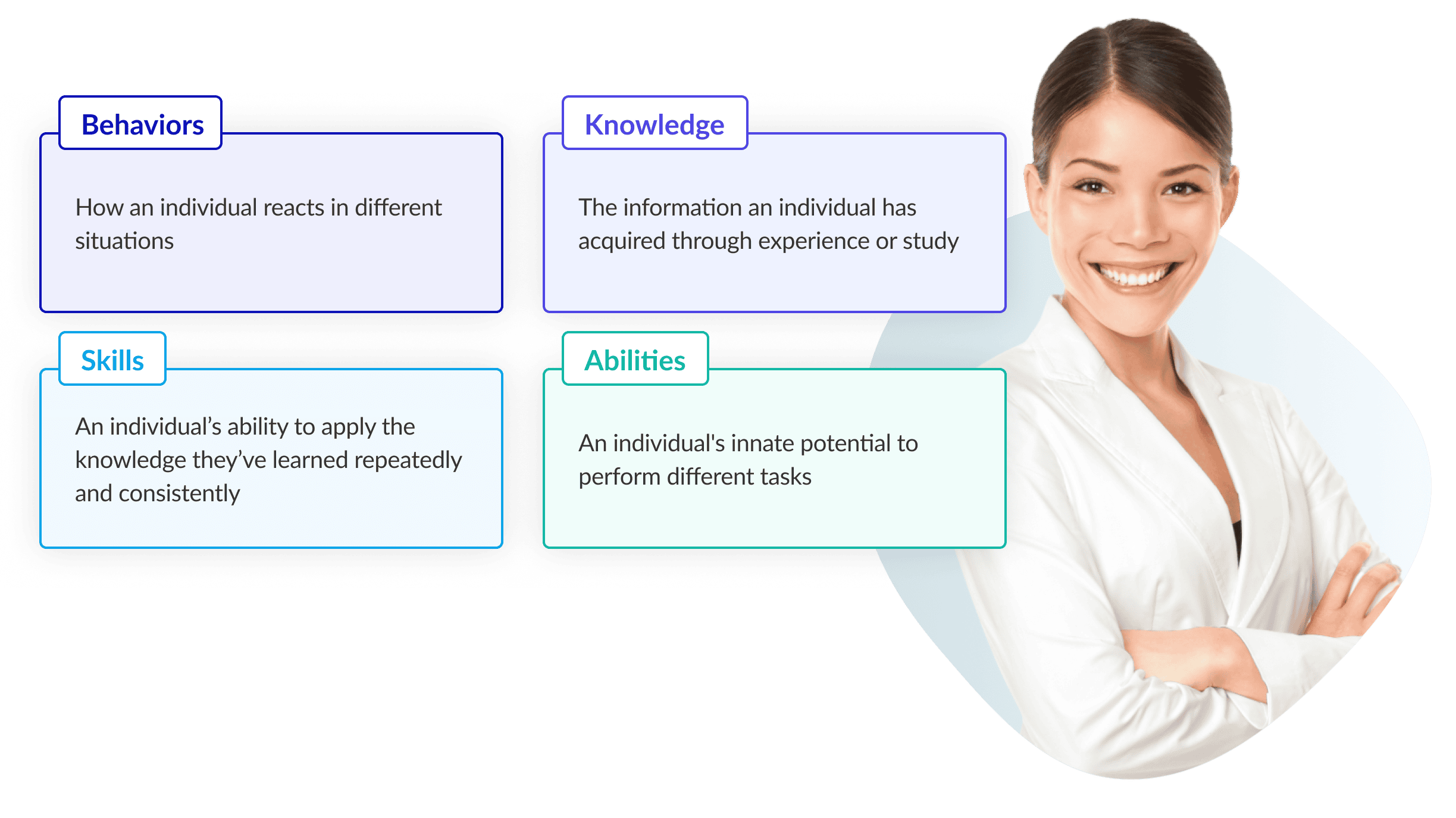
How to Ask Effective Competency-Based Interview Questions
Written by
Sam CookAbout the Author
Sam is an educator with ten years of mentoring experience and currently specializes in employee engagement and research.
Reviewed by
VidCruiter Editorial TeamAbout the Reviewer
The VidCruiter Editorial Team offers practical recruitment advice, drawing on insights from seasoned professionals. Our award-winning content, supported by industry specialists, underscores VidCruiter's dedication to innovation in recruitment.
Last Modified
Mar 25, 2024Competency-based interview questions are designed to assess how well candidates display the critical knowledge, skills, and abilities that underlie effective job performance. Identifying competencies is typically part of the structured interview process, and they are linked to the role and your organization’s values and business objectives.
What Are Competency-Based Interview Questions?
Competency-based interview questions ask candidates to go beyond surface-level answers, allowing you to examine how well a candidate displays core workplace competencies.
However, that assumes two things are already true within your human resources department:
- You have a standardized definition of what “competency” means.
- You have an established competency model that you can use as a foundation for creating competency interview questions.
Before you develop any competency questions, you should create this definitional framework. From there, you can establish a more refined, consistent, and repeatable structure for your interview questions by creating an interview guide.
What Are Competencies?
The National Institute of Health provides an excellent definition of competency:
“Competencies are the knowledge, skills, abilities, and
behaviors that contribute to individual and organizational
performance.”
You can break down your understanding of these competencies by further defining each of those keywords:

Common competencies employers look for include teamwork, responsibility, decision-making, communication, integrity, result orientation, and problem-solving (PossibleWorks).
Interviewers and hiring managers assess for competencies using competency-based interview questions and answers. However, the most important thing to remember when asking competency questions is consistency. Structured interviewing ensures that you are able to fairly rate each candidate, and helps to remove bias from the interview process.
Need guidance on developing a structured interview process?
Learn how to conduct a structured interviewWhat Is a Competency Model?
A competency model is an extension of the competencies that matter to your organization.
There are two ways to approach the competency model, both of which you may want to consider:
- Create a broadly defined competency model for the organization.
- Create a more refined and specific competency model for each role or job classification.
Either or both of these approaches will work as a foundation for creating competency-based interview questions. While both are useful, creating a competency model for each job classification will be much more time-consuming. However, role-specific competency models may help you better identify the best candidate for each position.
As part of conducting thorough structured interviews, best practice is using a mixture of both models since they offer different benefits. You can incorporate both competency models into your interview question set by asking one or two questions that assess organizational competencies and making the rest specific to the job competencies. This may seem like a lot of work, but you only need to determine organizational and role-focused competencies once, unless you redefine a role or major changes happen on a company level.
Whether your model is broadly defined or role-specific, you should do the following:
Identify the behaviors that are consistent with success based on previous experience.
Provide a detailed list of the knowledge and skills that are critical to success.
Define and show some examples of what the ability to perform a task looks like.
How to Choose Competencies
In structured interview processes, it’s common to use a job analysis to determine what competencies are needed to succeed in the role. The University of Nebraska defines a job analysis as “the process of gathering and analyzing information about the content and the human requirements of jobs, as well as, the context in which jobs are performed.”
There are several methods to conduct a job analysis. According to Forbes Advisor, you can distribute a questionnaire, interview past employees, use direct observation, review a work log, or actually perform the job to get firsthand information.
Don’t underestimate the power of a job analysis — it can make your competency questions significantly better at predicting who would be a good hire.

Competency vs. Behavior-Based Interviews
You may have noticed that competency-based interview questions have a behavior aspect to them. It begs the question: Why aren’t behavioral-based interview questions used when you want to assess something more tangible, such as skills, or knowledge?
Behavior is an important part of competency, but it doesn’t represent the whole picture on its own. For example, someone may have an exceptional level of knowledge about the role but may lack the type of workplace behaviors that are critical to success in that role. It’s not an uncommon situation to encounter, especially if you’re hiring for leadership positions. Many candidates have years of experience and would be considered subject matter experts by all rights. Yet they may lack the type of behaviors your organization has found are critical to success in leadership positions.
In that situation, you may ultimately hire that individual as a senior-level contributor, but not into a leadership role.
Respectfulness is a critical leadership behavior
According to research conducted in collaboration with the Harvard Business Review, “respect” emerged as the most important leadership behavior that employees look for within management.

Types of Competency-Based Interview Questions
As noted earlier, there are several types of competencies that will underpin the interview questions you create for your interviews. We referred to behavior, skills, knowledge, and abilities as some of the competencies you may want to focus on. However, these are broad categories. You may find it beneficial to take a targeted approach with more granular questions aligned to competencies specific to the job roles for which you are hiring.
For example, you may want to create questions that assess the candidate’s competencies in these areas:
- Accountability
- Collaboration
- Communication skills
- Customer focus
- Leadership skills
- Integrity and trust
- Learning and development
To help get you started, below are three common competency-based questions based on specific competencies, plus a short explanation of how to assess a candidate’s response to that question.
Accountability
When you assess a candidate's competency in accountability, you are looking for their ability to take ownership of tasks, make commitments without excessive hesitation, and deliver on those commitments reliably.
Here’s a question you could ask to assess accountability:
“Can you describe a situation where a project or task you were responsible for did not go as planned? What actions did you take to rectify the situation, and what did you learn from the experience?”
This question seeks to understand how the interviewee handles failure. Did the individual attempt to pass off blame on someone else? Do they take full responsibility for it? You may want to look for certain actions in their response, such as immediately notifying a manager and creating an action plan to solve the issue.
Collaboration
When you assess a candidate's competency in collaboration, you are looking for their ability to work together within a team setting to complete tasks or solve problems.
Here’s a question you could ask to assess collaboration:
"Can you share an example of a challenging team project you've worked on? How did you contribute to the team's efforts, and how did you handle any conflicts or differing opinions within the group?"
This question seeks to better understand not only the level at which an interviewee contributes to a collaborative project but also helps you identify areas where ego may get in the way of collaboration. How the interviewee answers this question could help uncover someone who is a legitimate team player or someone whose only concern is personal gain and career advancement.
Communication Skills
When assessing a candidate's competency in communication, you're looking for their ability to effectively convey ideas, listen actively, and adapt their messaging to different audiences and situations.
Here’s a question you could ask to assess communication skills:
"Can you describe a time when you had to communicate a complex idea or strategy to a team or client who was not familiar with the subject? How did you ensure your message was understood, and what feedback mechanisms did you use?"
This question will help you understand not only the type of communication skills the interviewee prefers to use or is capable of using, but also gives you more insight into what they believe communication means. It can help you align their understanding of and skills in communication with what’s expected within your company.
How to write competency-based questions
If you want to make more competency questions, consider using the same format as above.
- Pick a competency.
- Identify how this compentency is demonstrated in the context of the role you're hiring for.
- Create a question that allows the interviewee to exhibit or reflect on the use of that competency in practice.
- Provide a rationale for how that question helps you understand that candidate’s alignment to that competency.
Using STAR To Answer Competency-Based Interview Questions
Candidates will often use the STAR method to answer competency-based interview questions. It’s a methodical way for candidates to organize their thoughts, make sure they touch on the competencies you mentioned in the job description, and answer questions about their previous experiences without going too off track.
When candidates use the STAR method, it can make it easier to rate their answers and identify the difference between effective and ineffective responses to the question.
STAR stands for…
Situation: The context
or background for a specific event or challenge
ask: The
specific responsibility or objective the individual faced
Action: The steps taken
to address the situation or complete the task
Result: The outcome or
impact of those actions
Here’s an example of how a candidate would use the STAR method to answer a question aimed at evaluating accountability as a competency.
“Can you describe a situation where a project or task you were responsible for did not go as planned? What actions did you take to rectify the situation, and what did you learn from the experience?”
- Situation
“There was a situation when I was a freelance HR consultant where my report was not in line with what the client wanted and it was already past the deadline.”
- Result
“I met with the client to debrief and see how I could prevent that from happening again. I realized I should’ve asked for samples of their other reports so I could make mine more consistent with what they already do. Lesson learned.”
- Action
“I requested a meeting with my contact, apologized for the confusion and initiated a conversation about what needed to change. I made the changes as quickly as possible.”
In the next section, we’ll explain in more detail effective ways to evaluate STAR interview responses like the one above.
How to Evaluate Candidate Responses to Competency-Based Questions
Evaluating responses should be standardized and replicable for each candidate. Consider the following ways to help you conduct fair and equitable interviews.
Use Video Interviews That Allow You to Record Candidate Responses
Video interviewing allows you to refer back to interviews later if you need to rewatch or reassess a candidate’s response to a question.
Conduct Interviews Using a Panel Instead of 1-On-1
Interview panels can at times be intimidating to candidates, but they help remove bias during the hiring process. Past the screening stage, try as much as possible to conduct panel interviews and make sure your panel represents a diversity of backgrounds, experience levels, and perspectives.
Best Evaluation Format for STAR Responses
Because the answers to these questions will have some level of subjectivity, an interview scorecard will reduce biases as you evaluate the responses, especially when combined with a panel. Consequently, this is why events like Olympic sports use multiple judges with set rating criteria to judge an individual performance.

Structured interviews increase success at hiring
Multiple studies show that companies using structured interviews improve their hiring. In summarizing this research, the U.S. Office of Personnel Management explains that structured interviews “increase interviewers' agreement on their overall evaluations by limiting the amount of discretion an interviewer is allowed.”
This means your interview panels will be more successful at identifying the right candidates when your interviews use a structured approach.
What To Look For in Competency-Based Interview Answers
People have different experiences, so you should not expect every answer to be exactly the same. Instead, you should be looking for signs that indicate the person answering the question is doing so honestly.
To that end, when conducting interviews where you’re using competency-based questions, look for the following:
Specificity in the response: Candidates should be able to easily recall and talk in detail about their examples. If it seems like a candidate is having difficulty responding to the question or that the response seems jumbled, it likely means they don’t have an example to give that would adequately address that competency.
Outcome-focused responses: In most cases, your competency questions will be looking to identify an outcome to an example or situation. Your ideal candidates are those who can easily speak to the outcome, whether prompted or unprompted by you.
Transparency: There are times when a candidate may not have an answer to a competency question. It’s just as important for them to be able to admit to that as it is for them to have an example to demonstrate it. Look for that type of transparency and honesty from candidates who know and can admit readily to their limitations.
Alignment with company values or objectives: Ideally, candidates' responses to the competency questions you ask should align with the values and objectives you have for your organization.
Paying close attention to these key look-fors will also help you determine what each point in your rubric should represent and how to properly score candidates when they provide you with answers to your competency questions. The rubric will play an essential role in your structured interview and provide relevant data you can include in your applicant tracking system.
Frequently Asked Questions
How Do You Structure a Competency-Based Interview Question?
You can create competency-based questions by using the STAR method as a conceptual framework. Use open-ended prompts like "Describe a time when..." or "Tell me about an instance where..." This encourages candidates to reply using the STAR method (Situation, Task, Action, Result). It also makes assessing candidate responses much easier as you can align your rubric around how effectively the answer fits within that same framework.
What Type of Questions Should I Avoid Asking in an Interview?
Avoid asking questions that are too personal, irrelevant to the role, invasive, or discriminatory. Questions that require candidates to talk about their marital status, religion, or personal health should also be avoided. Make sure that your questions fit within the legal framework and employment practices of the country where you're hiring.

E-BOOK
The Modern Guide to Structured Interviewing
Get your free copy of VidCruiter’s comprehensive white paper about structured interviewing. This practical guide:
-
Shows you how you can use technology to optimize your hiring
-
Teaches you how to develop and conduct a structured interview process
By providing email address, you agree to receive updates
from Vidcruiter.
Read our Privacy Policy.



